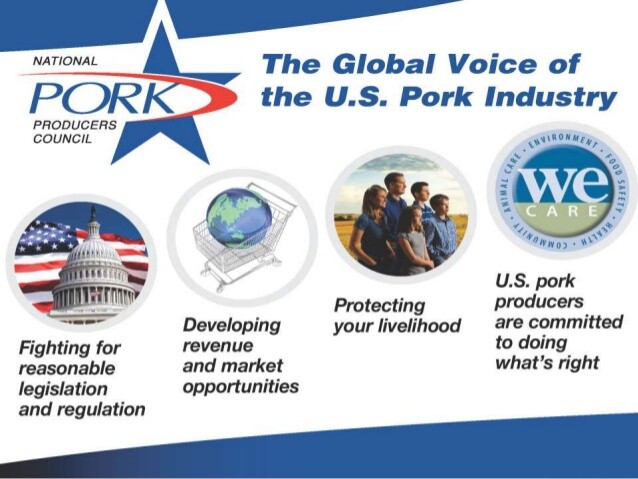hankyoreh
Links to other country sites 다른 나라 사이트 링크
USTR confronts competing interest groups regarding revision of KORUS-FTA

The US pork industry has joined the beef industry in protesting revision of the South Korea-US Free Trade Agreement (KORUS FTA). While interests have already begun clashing within US industries before the start of negotiations to revise the agreement, the one-month deadline stipulated in the FTA for opening these discussions passed on Aug. 12.
According to the US Federal Register website on Aug. 13, the National Pork Producers Council (NPPC) submitted an opinion in the KORUS FTA and other trade agreements to the US Trade Representative (USTR) on July 31. “Our chief concern about the KORUS FTA is that the agreement could be abolished,” the NPPC wrote in its opinion. “Because South Korea is in a process of abolishing all US pork import duties through the KORUS FTA, abolishment of this agreement would put us in the disadvantageous position of giving up the South Korean market to the European Union and Chilean pork industries,” it said.
Prior to the KORUS FTA taking effect, import duties on US pork ranged between 22.5% and 54.0%. South Korean imports of US pork stood at 87,000 tons before the agreement in 2010, but had increased to 139,000 tons as of last year.
Previously, the heads of the three beef industry groups, including the National Cattlemen's Beef Association (NCBA), sent a letter to US Trade Representative Robert Lighthizer saying they did not support any changes to the KORUS FTA, as it would threaten US beef’s market share and massive existing investments in the South Korean market.
As of July 31, the USTR had received opinions on the KORUS FTA and all other US trade agreements from various interest groups and governments. It is a complex situation where the steel, automobile, semiconductor, and other manufacturing industries have strongly demanded revision of the KORUS FTA, citing negative trade balances in various sectors, while livestock product industries have voiced opposition to either abolishment or even amendment of the agreement. With interests pitted sharply against each other within US industries, their positions are emerging as potential variables affecting the negotiation strategies of South Korea and the US as they wage a tense war of nerves.
Amidst all of this, Seoul shared its own response to the KORUS FTA amendment pressures in an opinion submitted to the USTR on July 31, bearing the name of the South Korean ambassador to the US. In the letter, it referred to the FTA as “mutually beneficial,” offering analyses of the increases in exports for all 50 US states since the agreement took effect. It noted that exports to South Korea had risen for 40 out of 50 states between the five years prior to the FTA (2007-11) and the five years after (2012-16); for 14 states, including Ohio, Mississippi, and Indiana, it claimed exports had risen by over 50%. In particular, it argued that despite US President Donald Trump’s claims to the contrary, even US manufacturing has benefitted from the FTA, noting a 45% annual rate of increase in exports for the Rust Belt states widely viewed as Trump’s support base, which include Pennsylvania, Ohio, and Michigan.
Meanwhile, Aug. 12 marked one month since the USFTR submitted a written request to hold a special session of the Joint Committee on the KORUS FTA. With no response from the US to the reply sent to Washington on July 24 by the South Korean Ministry of Trade, Industry and Energy, the two sides have yet to establish a date, venue, or agenda for the first meeting. The agreement texts state that the first meeting should take place within 30 days of receipt of a request for one.
By Cho Kye-wan, staff reporter
Please direct questions or comments to [english@hani.co.kr]

Editorial・opinion
![[Column] Season 2 of special prosecutor probe may be coming to Korea soon [Column] Season 2 of special prosecutor probe may be coming to Korea soon](https://flexible.img.hani.co.kr/flexible/normal/500/300/imgdb/original/2024/0426/3317141030699447.jpg) [Column] Season 2 of special prosecutor probe may be coming to Korea soon
[Column] Season 2 of special prosecutor probe may be coming to Korea soon![[Column] Park Geun-hye déjà vu in Yoon Suk-yeol [Column] Park Geun-hye déjà vu in Yoon Suk-yeol](https://flexible.img.hani.co.kr/flexible/normal/500/300/imgdb/original/2024/0424/651713945113788.jpg) [Column] Park Geun-hye déjà vu in Yoon Suk-yeol
[Column] Park Geun-hye déjà vu in Yoon Suk-yeol- [Editorial] New weight of N. Korea’s nuclear threats makes dialogue all the more urgent
- [Guest essay] The real reason Korea’s new right wants to dub Rhee a founding father
- [Column] ‘Choson’: Is it time we start referring to N. Korea in its own terms?
- [Editorial] Japan’s rewriting of history with Korea has gone too far
- [Column] The president’s questionable capacity for dialogue
- [Column] Are chaebol firms just pizza pies for families to divvy up as they please?
- [Column] Has Korea, too, crossed the Rubicon on China?
- [Correspondent’s column] In Japan’s alliance with US, echoes of its past alliances with UK
Most viewed articles
- 1[Column] Season 2 of special prosecutor probe may be coming to Korea soon
- 2‘We must say no’: Seoul defense chief on Korean, USFK involvement in hypothetical Taiwan crisis
- 3Division commander ordered troops to enter raging flood waters before Marine died, survivor says
- 4Is N. Korea threatening to test nukes in response to possible new US-led sanctions body?
- 5Is Japan about to snatch control of Line messenger from Korea’s Naver?
- 6No good, very bad game for Korea puts it out of Olympics for first time since 1988
- 7[Editorial] Korea’s surprise Q1 growth requires objective assessment, not blind fanfare
- 8Korea’s 1.3% growth in Q1 signals ‘textbook’ return to growth, says government
- 9N. Korean delegation’s trip to Iran shows how Pyongyang is leveraging ties with Moscow
- 10Amnesty notes ‘erosion’ of freedom of expression in Korea in annual human rights report